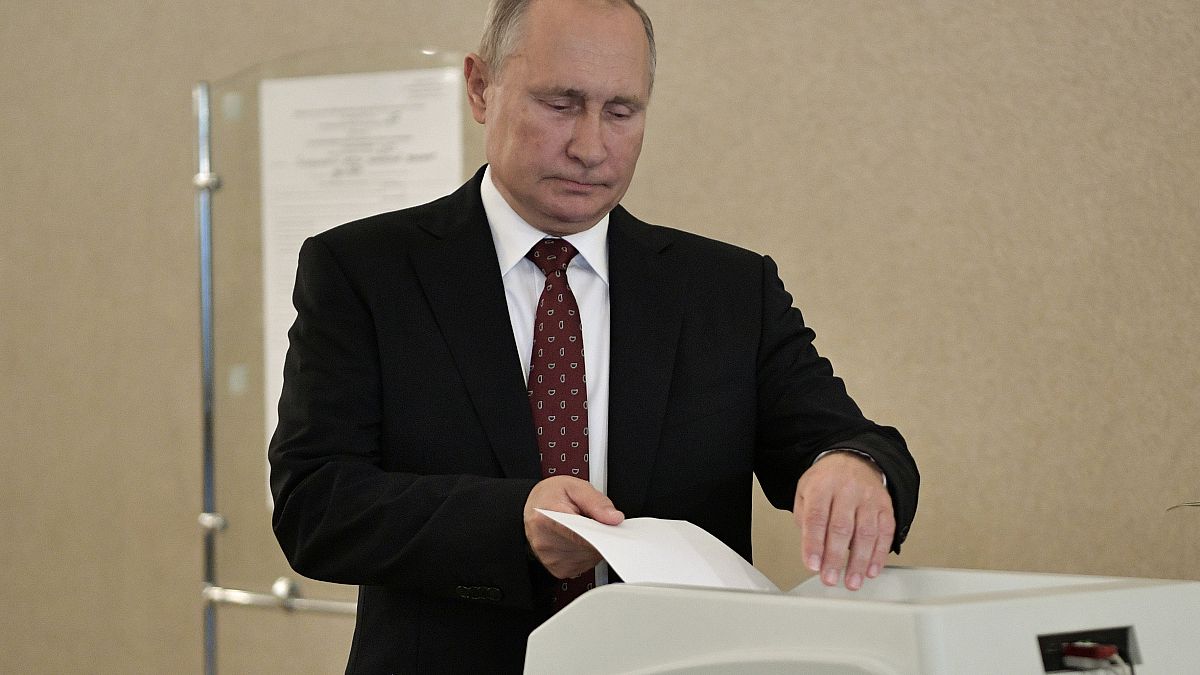Russia's ruling party has seen its majority decrease dramatically in Moscow’s city legislature after a summer of protests
Russia's ruling party has seen its majority decrease dramatically in Moscow’s city legislature after a summer of protests.
Candidates from United Russia, which supports President Vladimir Putin, were on course to claim 26 seats of the City Duma’s 45 seats, according to RIA news agency, citing nearly-complete election data.
This is down 16 from the 40 the party previously held, while the Communist Party was reportedly going to win 13 seats, the centre-left A Just Russia three seats and liberal party Yabloko three seats, coming back from its leader, Sergei Mitrokhin, initially being banned from standing.
It suggested a tactical voting strategy pushed by Putin's opponents may have worked — prominent opposition politician Alexei Navalny advised his supporters to vote tactically across Russia for the candidate with the best chance of defeating United Russia.
Several regional and local elections took place across Russia on Sunday following two months of intense protest in the capital to denounce the authorities' decision to ban opposition and independent candidates from running.
Most of the attention has been focused on Moscow, where rallies calling for free and fair election were organised every weekend throughout July and August, gathering tens of thousands in the biggest social unrest movement to rock the country in years.
Thousands were detained by police and several protesters have now been sentenced to several years in jail for "using violence against law enforcement."
Despite few opposition or independent candidates being allowed to run, there were 225 candidates for 45 mandates up for grabs in Moscow.
READ MORE: Moscow protester gets 3.5-yr jail term for throwing rubbish bin at police
United Russia
President Vladimir Putin, who voted at the Academy of Science, said that "in some countries, there are 30, 50 and 100 (candidates in ballot list)," adding that what matters "is not the quantity but the quality."
"I hope that we have decent candidates," he added.
Opposition leader and prominent Kremlin critic Alexei Navalny called on people after casting his own ballot to choose the most promising rivals to candidates from Putin's former United Russia party.
"Last time, United Russia received 40 of the 45 mandates. If they get any less, it will be good," he said.
But none of the pro-Kremlin candidates actually ran under the United Russia banner in Moscow this year, taking a leaf from their Putin's book, who ran as an independent candidate in the presidential election after the party started slipping in the opinion polls.
Sunday's polls were the biggest test for the authorities before the legislative elections in 2021 which will largely determine the political future of the country as Putin is expected to step down in 2024.
Experts believe the backlash against Putin's grip on power is getting stronger and that protest voting will be especially strong in the capital, but also manifest itself in other regions.
READ MORE: What you need to know about Russia’s vote on Sunday
Violations
A "map of violations" by the Golos electoral watchdog recording possible violations to people's vote to rights and freedom of expression received more than 1,500 messages from across the country. The biggest hotspots were Moscow, St Petersburg and Tatarstan.
They flagged alleged violations regarding access for media representatives, observers and members of commissions as well as bribery and coercion of voters.
"Most often they report restrictions on photo and video shooting and timely access to the polling station," a Golos human rights activist said, noting that the problem is more acute in these elections than last year.
However, the head of the Central Election Commission, Ella Pamfilova, accused the NGO of sharing false information by including alleged violations from the past year.
Furthermore, the country's state communications watchdog, Roskomnadzor, said Google and Facebook had distributed political ads on Sunday despite a ban to do so.
"Such actions can be seen as interference in Russia's sovereign affairs and hindering the conduct of democratic elections in the Russian Federation," it said in a statement, adding that it would forward the data to parliament.
READ MORE: Hundreds detained in Moscow protest for fair election
Moscow
About 7.2 million voters are registered in the Russian capital. Three districts allowed voters to cast their ballot online with 90% of those who cast their vote doing so on the electronic system, according to official figures.
But Golos flagged that several malfunctions had been reported. "At least twice, online voting organisers confirmed the malfunction and assured that the system was restored," Golos added.
The system had previously been criticised but developers claim that repeated tests had improved its reliability and security.
Turnout in the Russian capital was quite poor, amounting to no more than 17% and exit polls were not available because a lot of voters refused to tell pollsters how they had cast their ballot, the Civil Society Development Fund said.
"In some districts, the failure rate exceeded 70%. In other districts, it is around 45-50%. All this suggests that the publication of such unweighted and contradictory data would be an unprofessional act," the fund said.
The social-liberal Yabloko party said however that all four of its candidates had been elected, while the head of the Moscow branch of the Communist Party said it would have 13 representatives on the city council.
Alexei Venediktov, head of the Public Headquarters for monitoring the election of deputies of the Moscow City Duma, said that there were no significant violations.
Earlier on in the day, police detained about 10 people in central Moscow dressed in T-shirts in support of protesters facing jail sentences. Among the detainees was a municipal deputy and journalist Ilya Azar, who was quickly released.
